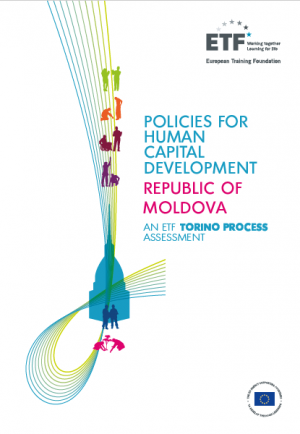The ETF assessment provides an external, forward-looking analysis of Moldova's human capital development (HCD) issues and vocational education and training (VET) policy responses from a lifelong learning perspective. It identifies challenges relating to education and training policy and practice that hinder the development and use of human capital. It takes stock of these challenges and puts forward recommendations on possible solutions to address them.
These assessments are a key deliverable of the Torino Process, an initiative launched by the ETF in 2010 aimed at providing a periodic review of VET systems in the wider context of HCD and inclusive economic growth. In providing a high-quality assessment of VET policy from a lifelong learning perspective, the process builds on four key principles: ownership, participation, a holistic approach, and evidence-based analysis.
For the ETF, HCD is the provision of support to countries for the creation of lifelong learning systems that provide opportunities and incentives for people to develop their skills, competences, knowledge and attitudes throughout their lives for the purpose of employment and the realisation of their potential, and as a contribution to prosperous, innovative and inclusive societies.
The objective of the assessments is to provide a reliable source of information for planning and monitoring national education and training policies for HCD, as well as for programming and policy dialogue in support of these policies by the EU and other donors.
The ETF assessments rely on evidence from the countries collected through a standardised reporting template (National Reporting Framework – NRF) through a participatory process involving a wide variety of actors with a high degree of ownership by the country. The findings and recommendations of the ETF assessment have been shared and discussed with national authorities and beneficiaries.
The assessment report starts with a brief description of the country's strategic plans and national policy priorities (Chapter 1). It then presents an overview of issues relating to the development and use of human capital in the country (Chapter 2), before moving on to an in-depth discussion of problems in this area, which, in the view of the ETF, require immediate attention (Chapter 3). Chapter 4 provides the overall conclusions of the analysis.
The annexes provide additional information: a summary of the recommendations in the report (Annex 1) and an overview of the education and training system of the country (Annex 2).
The ETF would like to thank to all members of the Torino Process working group in Moldova who worked on the preparation of the Torino Process national report. Particular thanks go to the Ministry of Education, Culture and Research, which provided valuable support throughout the process. The national Torino Process report compiled by the country itself can be found here: https://openspace.etf.europa.eu/trp/torino-process-2018-2020-moldova-national-report.
